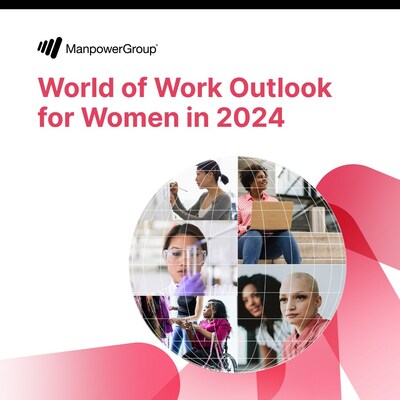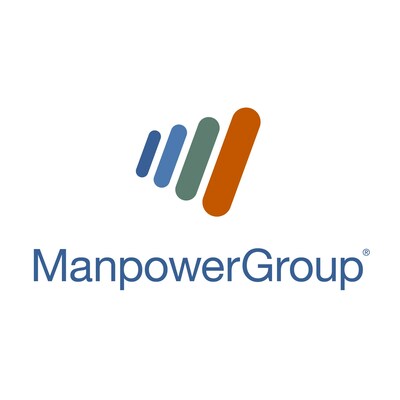Road to Workplace Equality Still Steep But Employers Making Gains Through Initiative, Innovation
The "World of Work Outlook for Women in 2024" finds less than half (
"In a world of talent shortages, we need everyone contributing to employment in a meaningful way. Bringing women into the workforce with an equal playing field is an economic imperative, not a nice-to-have," said Becky Frankiewicz, ManpowerGroup Chief Commercial Officer. "Knowing what women expect and need is the foundation for building equity. Actively upskilling, empowering allyship, leveraging technology to enable flexibility - this is how we unlock potential and growth, both for women and organizations."
KEY FINDINGS
- Flexibility Drives Retention – Over one-third (
37% ) confirm flexible working policies are most effective for retaining and attracting diverse talent. Other top initiatives: Leadership development (30% ), inclusive culture (29% ), coaching/mentoring (28% ) and academic partnerships (24% ). - Learnability Promotes Advancement – Three in 10 organizations (
30% ) report leadership development programs are effectively narrowing gaps that historically have prevented promotion to management. - Innovation Powered by Tech –
65% of employers say new technology has helped them be more flexible, promoting more gender equality,62% said tech is diversifying their IT talent pipelines,61% cite advancing tech as helping gender equality, and52% said that AI-based tools are aiding with the recruitment of the best candidates regardless of gender. - Mixed Progress on Pay Equity – Just over half (
52% ) of respondents report pay equity initiatives are on schedule, while the remaining48% are behind or have no initiatives. Financials & Real Estate (59% ), Communications Services (58% ), and Information Technology (58% ) are outpacing the global average, while Industrials & Materials (51% ), Consumer Goods & Services (50% ), and Health Care & Life Sciences (49% ) are lagging. - Uneven Representation by Role – Efforts to expand the number of women candidates vary by role type, with administrative (
51% ) and operational (48% ) positions leading the way. Less female representation is seen in science, technology, engineering, and mathematics (STEM) (43% ) and top-level management (42% ).
KEY OPPORTUNITIES TO ENGAGE WOMEN
- Empower Women's Allyship – Guide young women's career journeys early on. Facilitate mentorship and sponsorship programs for women led by senior executive female allies.
- Leverage An Internal Talent Marketplace – Implement AI-based talent marketplaces matching women's skills and aspirations to projects, gigs, and leadership opportunities enabling professional growth.
- Focus On Upskilling and Reskilling – Offer AI-enabled and virtual upskilling and reskilling to suggest personalized courses. Host tech academies to ensure women develop high-demand digital fluencies.
- Keep Flexible Benefits – Survey staff to shape policies supporting work-life harmony. With growing return-to-office plans, maintain caregiving benefits and hybrid remote options to retain women.
- Support Diversity, Equity, Inclusion, and Belonging (DEIB) Adequately – Embed DEIB goals into operations with executive support, clear KPIs, tools, and training that build capabilities across all levels.
The data draws on ManpowerGroup's 2024 Q2 Employment Outlook Survey of more than 40,000 employers in 42 countries, along with additional proprietary sources.
Download the complete "World of Work Outlook for Women in 2024" report to access additional statistics and tangible recommendations on how organizations can actively promote women's workforce participation and advancement.
ABOUT MANPOWERGROUP
ManpowerGroup® (NYSE: MAN), the leading global workforce solutions company, helps organizations transform in a fast-changing world of work by sourcing, assessing, developing, and managing the talent that enables them to win. We develop innovative solutions for hundreds of thousands of organizations every year, providing them with skilled talent while finding meaningful, sustainable employment for millions of people across a wide range of industries and skills. Our expert family of brands – Manpower, Experis, and Talent Solutions – creates substantially more value for candidates and clients across more than 70 countries and territories and has done so for more than 75 years. We are recognized consistently for our diversity – as a best place to work for Women, Inclusion, Equality, and Disability, and in 2024 ManpowerGroup was named one of the World's Most Ethical Companies for the 15th time – all confirming our position as the brand of choice for in-demand talent.
For more information, visit www.manpowergroup.com, or follow us on LinkedIn, X (formerly Twitter), Facebook, and Instagram.
![]() View original content to download multimedia:https://www.prnewswire.com/news-releases/road-to-workplace-equality-still-steep-but-employers-making-gains-through-initiative-innovation-302082590.html
View original content to download multimedia:https://www.prnewswire.com/news-releases/road-to-workplace-equality-still-steep-but-employers-making-gains-through-initiative-innovation-302082590.html
SOURCE ManpowerGroup









